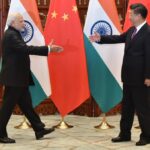Introduction to Kempty Falls: Kempty Falls is one of the most popular and iconic tourist attractions in Mussoorie, Uttarakhand, India. Nestled amidst the picturesque hills of the Garhwal Himalayas, the falls offer a refreshing retreat during the scorching summer months and a magical spectacle during the monsoon season. The sound of gushing water and the lush green surroundings create a captivating ambiance, making Kempty Falls a must-visit destination for nature lovers and adventure enthusiasts alike.
The Cascade Experience: As you approach Kempty Falls, the roar of the cascading water becomes more audible, heightening the sense of anticipation. Upon reaching the falls, you will be awestruck by the sight of water plummeting from a height of around 40 feet into a natural pool below. The misty spray of water creates a cool and invigorating atmosphere, providing a perfect escape from the summer heat.
Monsoon Magic at Kempty Falls: During the monsoon season, which spans from July to September, Kempty Falls transforms into a majestic spectacle. The rainwater enhances the flow of the falls, creating a cascading torrent that captivates all who witness it. The surrounding flora comes alive with vibrant colors, making the entire setting a photographer’s paradise.
Activities to Enjoy:
- Swimming: Take a refreshing dip in the natural pool formed by the cascading waters. The experience is invigorating and a great way to cool off in the summer or monsoon heat.
- Local Snacks: Savor delicious local snacks and street food sold by vendors near the falls. The aroma of freshly prepared treats adds to the overall experience.
- Nature Walks: Embark on short nature walks around the falls, exploring the rich flora and fauna of the region. The surrounding forests offer a serene escape from the hustle and bustle of city life.
- Capture Memories: Don’t forget to capture the mesmerizing moments through photographs. The scenic beauty of Kempty Falls is something you’d want to cherish forever.
Tips for a Memorable Visit:
- Wear comfortable clothes and carry swimwear if you plan to take a dip in the pool.
- Bring an extra set of clothes to change into after swimming.
- Be cautious while navigating the slippery rocks around the falls, especially during the monsoon season.
- Carry a waterproof bag to protect your belongings and camera from getting wet.
Conclusion: Kempty Falls in Mussoorie offers an enchanting escape into the lap of nature. Whether you visit during the summer or the monsoon season, the sight and sound of the cascading waters will leave you spellbound. Embrace the magic of Kempty Falls and create unforgettable memories amidst the beauty of the Garhwal Himalayas.




